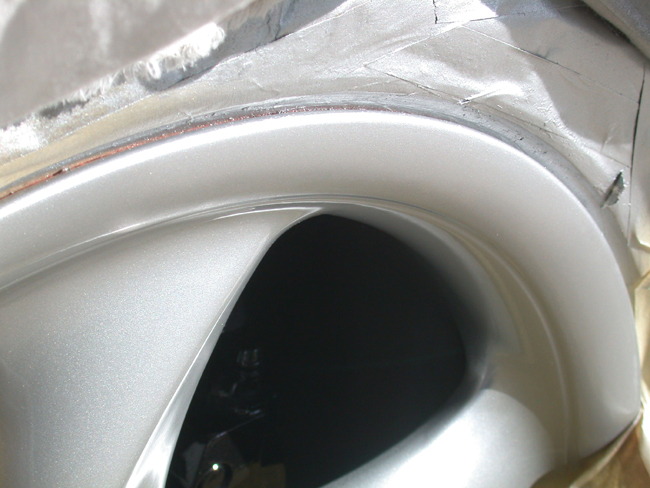Sent in by TomS , written by NASA racer on 2002-08-29 19:14:21
Note that although this is a Porsche painted wheel, the WURTH
wheel paint (silver) is used for ALL German painted wheels. Same
techniques apply for an S4:
Well, there I was...backing into a
parking space against a curb and I was in a hurry and I heard it...SCRAPE!
One fraction of a second...barely moving. Got out and looked at the
rim...OOOOOOWWWWW! 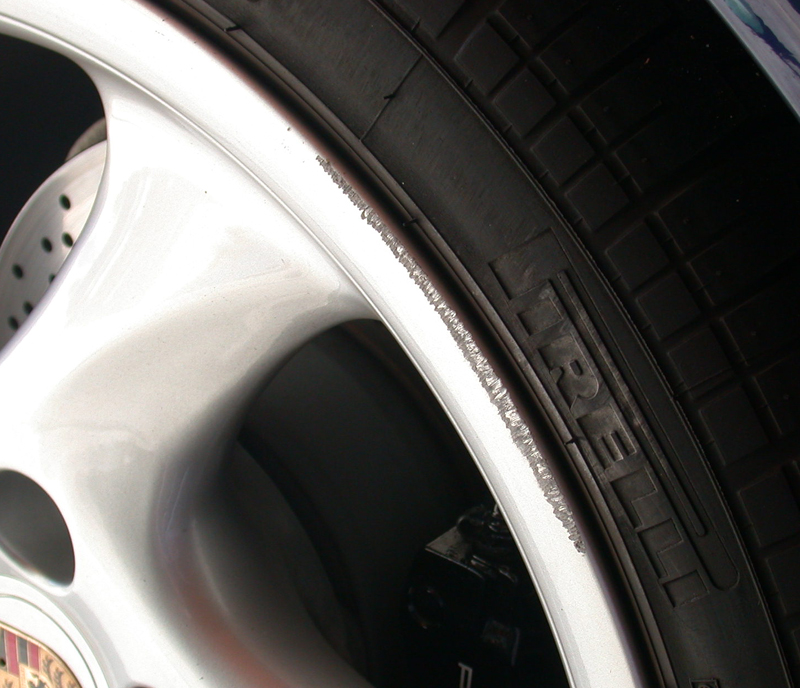
Well, no need to
fear...I've done this enough times to have a easy way to do home repairs
with a few simple items. Note that this ONLY covers light scuffs, this
isn't meant to be used to repair a DAMAGED wheel or one where the scuffs
cause significant damage to the rim. This is only for those annoying
superficial scuffs like happened to me more times than I care to admit.
Now there are PLENTY of GOOD services which can do this for VERY
reasonable money...most folks will happily do this but I'm inpatient and
have the free time (generally) to spend a couple of hours doing this and
it REALLY takes the edge off donking my wheels when I know I can simply
fix it myself.
So if you are interested...here's what you need:
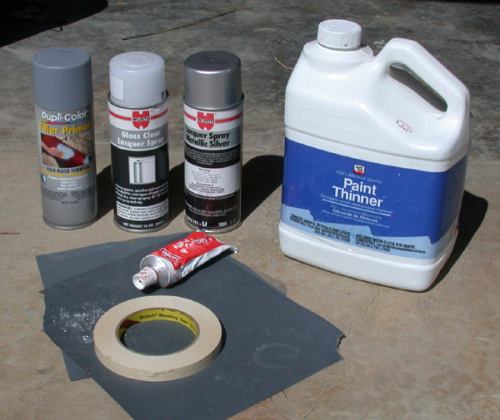
I have a
can of scratch-filler primer, the WURTH wheel paint and clear (got mine at
Performance Products), some paint thinner, Bondo spot putty (or
equivalent), sand paper and some 240 and 400 grit sandpaper (if you are
REALLY anal...get some 600 grit).
Step 1.
Clean...clean...clean...and did I mention CLEAN! 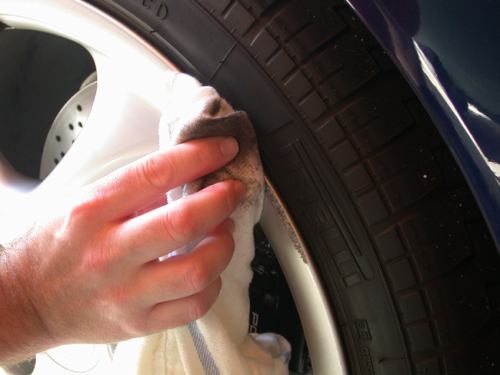
This is one of the most
important steps. Use paint thinner to THOROUGHLY clean the ENTIRE area
around the damage...you need to get ANY wax or polish or anything off the
wheel...I'm going to remind you EVERY step...I probably end up wiping down
these surfaces 10 or more times before painting...if you don't do this,
the rest is pointless. Also, we want to work ONLY on the area that's
damaged...don't go nuts and try to paint half your wheel on the car...for
this technique to succeed we want to sand and paint the area only
IMMEDIATELY around the damage.
2. Sand and Putty 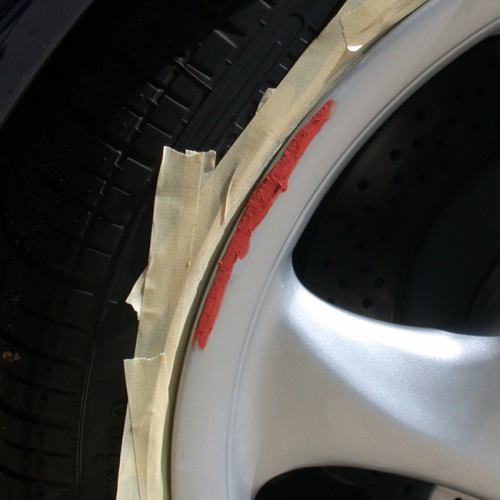
I like to START by
masking the tire from the wheel...get the masking tape WELL behind the
rim. Next, sand the area to a nice "feather" with 240 grit sandpaper and
wipe some spot putty on. IMPORTANT...this ENTIRE project will work best if
the wheel is in the sun and its a nice warm day...the drying time of spot
putty is minutes but if it's cold or damp, this project is likely to not
work out too well. Remember...keep your sanding to the IMMEDIATE area
around the damage. Trust me on this.
So once you've done the first
round of putty, switch to the finer of your sandpaper (400 grit in my
case) and sand and putty until it FEELS and LOOKS flush. Note that I use
the paper wrapped around a piece of wood to make a flat sanding block.
It's best to sand with a flat block to get the smoothest finish:
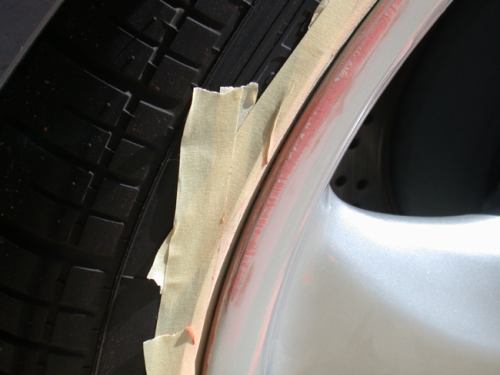
Note that up to this point...including
waiting 5 to 10 minutes between coats of putty that the whole project has
taken about 40 minutes. 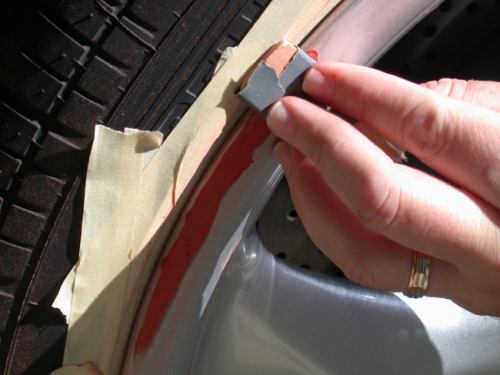
4.
Masking and primering: 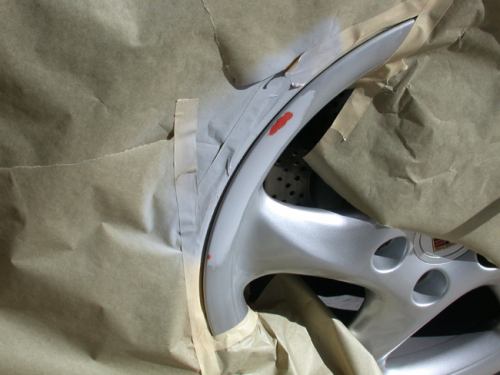
Okay, here's where a
bit of laziness is going to create an entire new clay-bar project. This
metallic paint will GET EVERYWHERE. I'm talking permanently attached to
the fender on the opposite corner of the car...mask CAREFULLY and COVER
THE WHOLE CAR with a sheet or equivalent.
I've used the thick
scratch-filler primer and sanded it and put a bit more putty on. Note that
this is the first place where I use the NASA technique. Immediately after
I spray the primer (or paint) I clean ALL the overspray off the spokes of
the wheel (clean rag and paint thinner) and the area around the inside of
the rim...I do NOT want to try to get paint to smoothly adhere to the
entire wheel! We just want to paint the REPAIR. Only the clear coat will
be sprayed without wiping off the overspray. Wait for the primer to fully
dry and lightly sand it with 400 or 600 grit sandpaper. 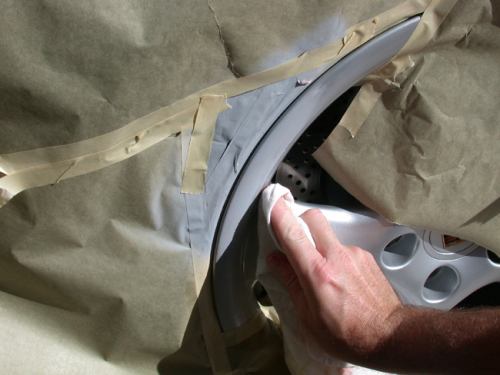
5. Painting
VITAL: READ THE CAN...if you try to use this paint in cold
temperatures (or in damp conditions) it's going to be a mess...shake the
can for a minute at LEAST and push the spray nozzle as you sweep across
and release at the end. This is roughly the distance I used the can from
the wheel...I HIGHLY recommend painting some scrap something to get used
to the distances and thickness this paint sprays. 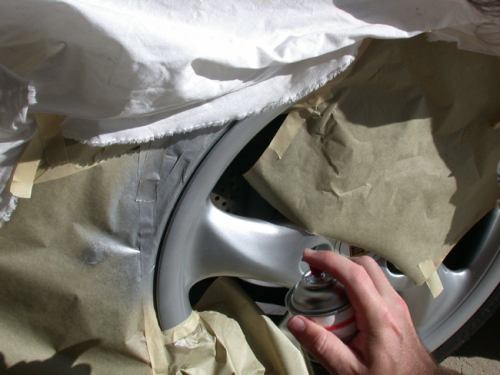
Now we SHOULD be
nearly done BUT (as always) Pete got inpatient and sprayed the clear WAY
too soon and lifted the paint and messed it all up. This is NO
BIGGIE...take a deep breath, get out your rag and the paint thinner and
take it all off. The thinner I used did not eat into the primer so I
simply cleaned the wheel (again) and got to respray the silver.
Here's the paint lifting because of the clear being sprayed too
soon. 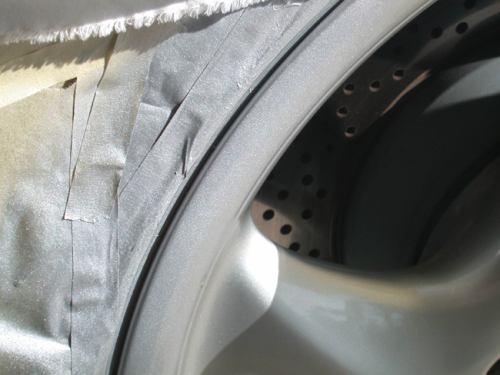
okay,
fast forward a few minutes...I had to roll the car forward a bit to keep
it in the sun and I had cleaned (and let fully dry) the wheel and
RE-sprayed the silver. Now I'm using the NASA technique on the silver
paint and CAREFULLY removing the overspray: 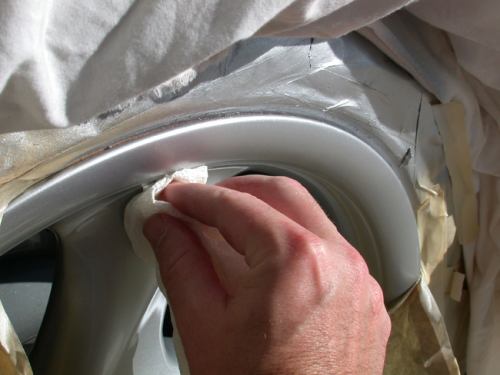
AND here's the
nicely painted wheel. I'm going to not be an idiot and let the paint dry
OVERNIGHT (like I knew i should) and do the clear coat and I'll post that
tomorrow. 